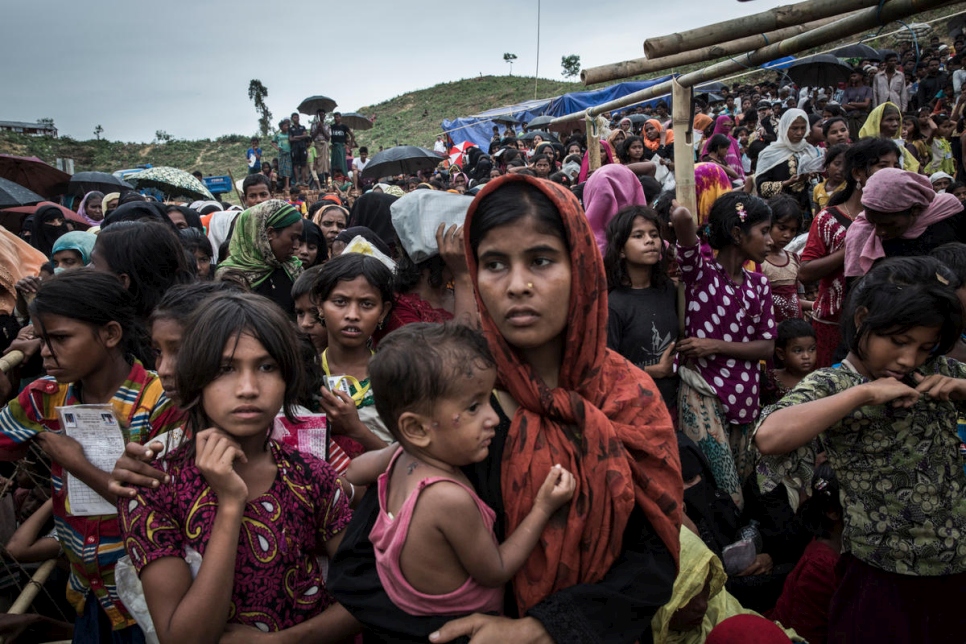Packed inside a bamboo hut, the children’s eyes light up as they watch an unfamiliar furry character on an unfamiliar screen, NBC News writes.
Most of the Rohingya children inside the world’s largest refugee camp here have never watched television. Now, with the help of a battery-powered projector, they’re laughing along with Elmo, the lovable Sesame Street character.
The clip, shown to the children earlier this year, is just a preview. Sesame Street will soon become an integral part of their experience at this sprawling settlement, home to more than 1 million Rohingya refugees who fled ethnic violence in neighboring Myanmar.
In a project more than a year in the making, Sesame Workshop is rolling out its first Rohingya Muppets, revealed exclusively by NBC News.
The characters, a pair of twins named Noor Yasmin and Aziz, are part of a $200 million effort to expand upon an innovative form of education at the camp.
“If we can help these children get off on the right start, where they can thrive, then they have so much more of a chance of succeeding later on,” Sherrie Westin, president of social impact for Sesame Workshop, said.
Westin is convinced that without a massive intervention by Sesame Street and its partners, the young Rohingya risk growing up unable to read and write or do simple math.
“Many of these children have experienced unthinkable horrors,” she said.
“Today, you have the neuroscience to show that if a child is exposed to traumatic experiences and prolonged stress that it literally debilitates brain development. For us to reach children in those critical early years, but especially children who’ve experienced trauma, we can play a significant role.”
Hundreds of thousands of Rohingya Muslims flooded into Bangladesh in August 2017 to escape a brutal crackdown by the Myanmar military.
The United Nations High Commissioner for Human Rights has described the government campaign as a “textbook example of ethnic cleansing.” At least 6,700 Rohingya, including at least 730 children under the age of 5, were killed in the month after the violence broke out, according to the medical charity Doctors Without Borders.
Over the next two years, roughly 200 Rohingya villages were razed, according to the U.N.
Most of those who fled the violence have been living at the Cox’s Bazar camp ever since.
Many of the roughly 700,000 children here have lost their parents. They live with other family members inside cramped huts made of bamboo and tarpaulin, with no running water or electricity. The refugees must walk to the limited pumping stations scattered throughout the camps to access clean water.
A grandmother named Merula has been living at the camp with her daughter and two grandchildren, ages 4 and 2 1/2, for the past two years. Merula said her family ran for their lives when members of the Myanmar military showed up at their village and set it on fire.
“We thought we would be killed,” she said.
The children, Ismabela and Bibijan, participate in an educational program at the camp known as the Humanitarian Play Lab. Developed by the humanitarian group BRAC, the lab uses play to help young children learn and recover from trauma.
“She’s getting clever,” Merula said of Ismabela.
Many parents and caregivers said they view education as the only way for the children to improve their lot in life.
“Without education, they are blind,” one mother packed into a makeshift tent during a women-only support group meeting said.
But with so many children and limited resources, learning opportunities have been scarce at refugee camps like this one.
The vast majority of humanitarian aid tends to go toward food and shelter. Less than 3 percent of all aid is used for education, Westin said.
“And only a tiny sliver to early education,” she added. “And yet, when these situations are so long and so protracted, if children who aren’t going back home and we’re not providing education, how can they expect to have the skills they need?”
Enter Sesame Street and friends – in the past three years, Sesame Workshop and the International Rescue Committee received two grants of $100 million – one from the MacArthur Foundation, the other from the LEGO Foundation – to create new ways to provide education for children who were growing up in refugee camps in Syria and Bangladesh.
